Got the Right Tools?
If you’re going to be a scientist, you’ve got to have the right tools. Here’s what you’ll need in your “toolbox.”

1. The Bible
Wait a second! The first and most important tool to becoming a discovery-making, disease-curing, star-studying, dirt-digging scientist is . . . the Bible? You bet! God told us what he did when he created the universe. And that’s the key to understanding how it all works.
Think of it like this. What if someone gave you a toy model with tiny pieces that were super-complicated to glue together, but no instructions? You’d have a really tough time knowing what piece goes where. What you thought was a car might actually be an airplane!
Scientists who study the world without the Bible as their starting point are really just guessing about the past and why things are the way they are. But with God’s Word, we’ve got the original inventor of everything telling us what he did, how we got here, when, and why.

2. The World Around You
It’s hard to be a scientist if you stay indoors and play games on your iPad. You need to get dirty and explore. (Better check with your mom or dad on the dirty part.)
Want to study animals? Keep a journal of the critters you see in your neighborhood or at the zoo. Fancy yourself an astronomer? Spend some evenings gawking up at the stars. Love dinosaurs? (And who doesn’t?) Take a trip to the science museum—as long as you keep in mind . . .

3. Books & Web
Not everything you see at museums, parks, and zoos will agree with what the Bible teaches. You have to think smart about what you hear or read. Watch out for anything that doesn’t line up with God’s Word.
How? Well, read books about science from people who believe what God says. They’ll help you get to the truth about the past and the world around us.
With your mom’s or dad’s permission, take a look at trusted websites (like KidsAnswers.org) to find books to get you started.

4. Other People
Learning about science is great, but learning from a scientist can be even more exciting. Opportunities may be closer than you think.
Maybe there’s a veterinarian near you who would love to let you take a look “behind the scenes” to see what it’s really like to help animals. Maybe a rock scientist (a geologist) at a local school gives talks to kids on her study of minerals. Maybe there are some hands-on classes at a children’s museum near your house (check out the Creation Museum, for example). Or maybe a local park offers guided tours to talk about trees and plants. Get involved!
Kids Answers Magazine
Do You Want to Be a Scientist?
If you’re going to be a scientist, you’ve got to have the right tools. Find out what you’ll need.
Browse Kids IssueRecommended Resources
- © 2024 Answers in Genesis
- Privacy Policy
- Contact
- About





